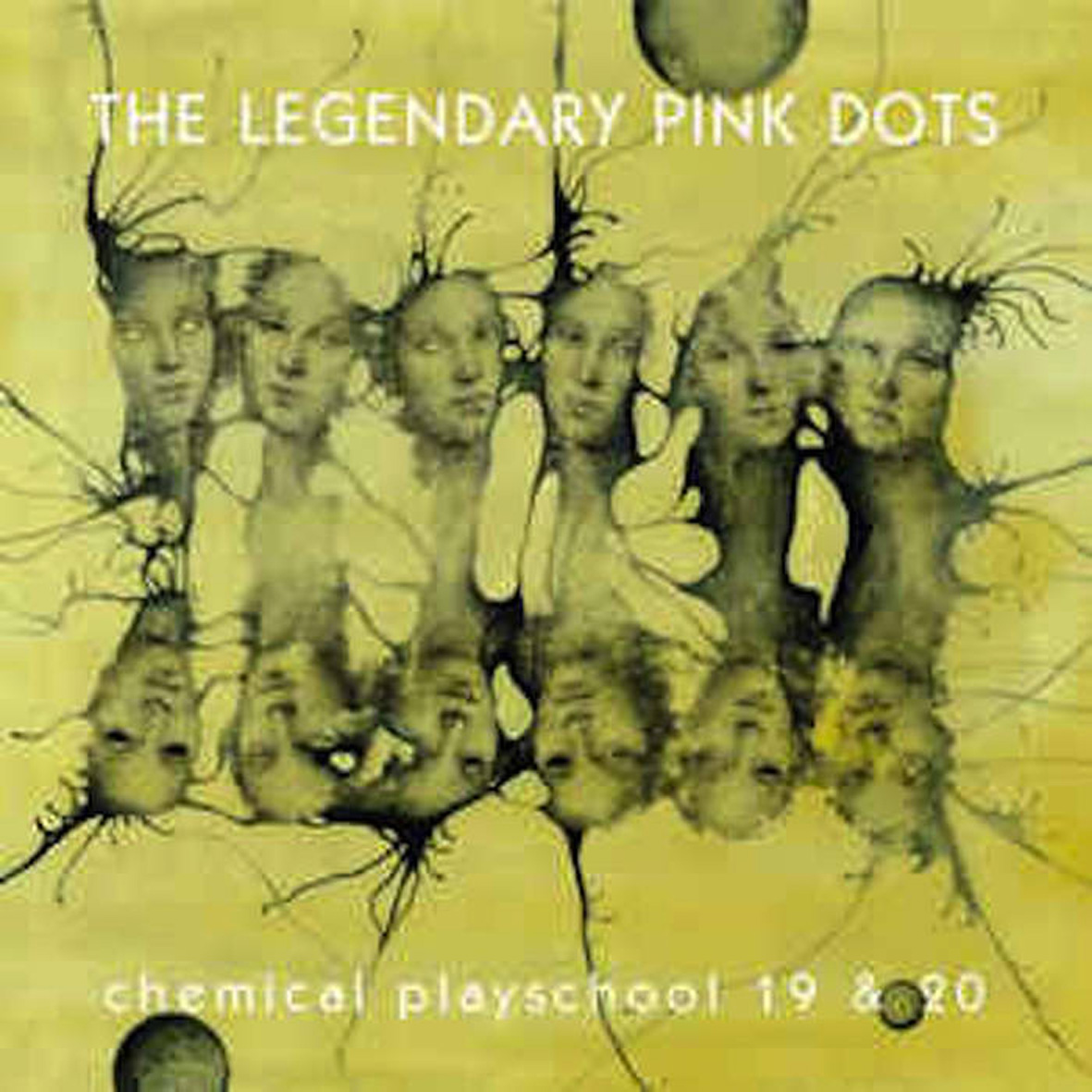Legendary Pink Dots, "Chemical Playschool 19 & 20"
 Over the last two decades or so, my Legendary Pink Dots fandom has gone through quite a few different phases, but my current self is most enamored with the Chemical Playschool series.  Each new installment always feels like a large and mysterious gift-wrapped box that unexpectedly shows up at my house, stuffed full of plenty of random things that I did not particularly want and a few revelatory surprises that absolutely knock me sideways (finding the latter is always the fun part, obviously).  This latest plunge into the band's unfettered experimental urges, quietly released for the band's fall 2016 tour, is an especially rich treasure trove: it does not so much feel like a meandering psychedelic fever dream of orphaned ideas and studio experiments so much as a rich tapestry of evocative and coherent themes expertly blurred together into a mesmerizing fantasia.  This is easily one of my favorite LPD albums in recent memory.
Over the last two decades or so, my Legendary Pink Dots fandom has gone through quite a few different phases, but my current self is most enamored with the Chemical Playschool series.  Each new installment always feels like a large and mysterious gift-wrapped box that unexpectedly shows up at my house, stuffed full of plenty of random things that I did not particularly want and a few revelatory surprises that absolutely knock me sideways (finding the latter is always the fun part, obviously).  This latest plunge into the band's unfettered experimental urges, quietly released for the band's fall 2016 tour, is an especially rich treasure trove: it does not so much feel like a meandering psychedelic fever dream of orphaned ideas and studio experiments so much as a rich tapestry of evocative and coherent themes expertly blurred together into a mesmerizing fantasia.  This is easily one of my favorite LPD albums in recent memory.
Uncharacteristically, Chemical Playschool 19 opens with "Real World," an actual catchy song that sounds like it would have easily fit on one of the Dots' more accessible album intended for (relative) mass-consumption.  Thematically, however, it fits very much into the overarching theme of sardonic commentary on the modern world that runs throughout the album.  Of course, "Real World" never quite reaches the finish line (this is a Chemical Playschool album, after all), appropriately dissolving into lysergic abstraction only to cohere anew as the similarly song-like (but much stranger) "El Cid."  Bizarrely, all of this material was recorded all the way back in blissfully pre-Trump and pre-Brexit 2015, which makes the tone of political pessimism eerily prescient, though that timeline might explain Ka-Spel's fixation on guns here, as 2015 was yet another prolific year for mass shootings in the US.  This year will probably be prolific in that regard too, but xenophobia seems to have seized the zeitgeist and become the hotter trend here these days.  Perhaps that will be the theme of the next pair of Chemical Playschools.
In any case, "Real World" and "El Cid" reveal themselves to be mere appetizers for a mesmerizing 30th anniversary re-envisioning of Asylum's classic "So Gallantly Screaming."  Edward Ka-Spel is in peak form, delivering a blackly funny and rhyming indictment of America over a simmering bed of drones and electronics ("Now the Hollywood sunset is served in a can").  As much as I love the content, I may love the phantasmagoric and shifting structure even more, as Ka-Spel drifts in and out of the piece, sharing the spotlight with a wonderfully surreal and sometimes nightmarish collage of samples.  The remainder of the Chemical Playschool 19 disc does not offer any more dazzling centerpieces of that caliber, but the quality level and focus stay atypically high with the gently burbling and shuffling reverie of "Sunset Strip" and the foreboding and industrial-damaged "Impeccable Machine." The languorous, understated and warped psych-rock of "How Many Fingers?" is especially wonderful, making me wish it were a stand-alone song. Part of that is highly subjective, as I always prefer Ka-Spel's wry and/or laid-back vocals to his more urgent ones, but "Fingers" also offers a very cool bass line and some nice flourishes of backwards melodies.
The Chemical Playschool 20 disc initially feels like more of the same, opening with a solid "rock" song ("Hysterical") followed by some woozy, synth-based ambient drift, but then the bottom drops out and the album plunges into a deep rabbit hole of utter derangement with "iTranslate."  Following a brief big band-style fanfare, Ka-Spel turns up to nervously announce the call letters of a fictional radio station (his halting and weary delivery resembles that of someone who has been in an interrogation room without sleep for a few days).  Then a considerably more animated radio announcer takes the mic to let me know that they are about to present the first ever interview with an alien from outer space (with Ka-Spel acting as translator, of course).  It initially seems like the Dots at their most cringe-inducing and proggily indulgent, but then it becomes unexpectedly very funny as the translation gets increasingly awkward and lewd ("may we eat and may we drink each other and exchange…biological yogurt?"). Then, after a sustained interlude of buzzing, druggy abstraction and warped choral samples, the band erupts into the best "song" on the album: "Amy in the Underworld," a delightfully kitschy bit of psych-pop built upon a foundation of skittering drums, liltingly melodic vocals, and swirling hallucinatory weirdness (Erik Drost even sneaks in some very surf-sounding guitar at the end).
Following the atypically radiant, major-key, and almost Beatles-esque balladry of "Miss August" (it thankfully gets a bit darker and more fractured as it progresses), the album comes to an end with a pair of absolutely perfect pieces in a row.  The first, "Carnival Cracker," is admittedly quite a brief one, but its blown-out cheap synth tones and maniacally insistent beat feel like a gleefully out-of control post-mutiny parade at a psychiatric hospital. Those short-lived festivities draw a close with the epic "The Answer (At Least for Today)," which captures Ka-Spel in narrative mode once more, this time in the guise of an omniscient sage dismantling the entirety of our mundane reality and understanding of time over a faintly sinister bed of The Silverman's synthesizers.  Again, Ka-Spel is in top form, managing to seem impossibly wise, witheringly sardonic, and playfully absurd all at the same time ("or you eat the alarm clock because it tastes like blueberries").  With an appropriately simmering backdrop of vague menace and the right degree of deadpan, messianic gravitas, Ka-Spel can make  just about anything seem like the most rarefied and profound revelation.  When I think about why I love the Legendary Pink Dots, it is generally pieces like "The Answer" that spring to mind–those rare and precious moments where it feels like I am receiving an intergalactic transmission of ancient wisdom refracted through a fog of psychedelics.
Of the two discs, I prefer Chemical Playschool 20, though it is not necessarily better than Playschool 19.  In fact, the first disc probably has the stronger songs and melodies.  On the album's second half, however, the band seem far more intent on breaking away from their expected trajectory and go much further out on their already rather outré limb.  Far more important than the differences between the two halves, however, are the similarities: while the whole point of the Chemical Playschool series is ostensibly to give free rein to more experimental urges, this latest plunge into the Dots' singularly skewed collective psyche shows welcome signs of rigorous editing.  While the content itself is certainly no less strange and adventurous than usual, it feels like all of the unnecessary fat and water-treading has been excised.  None of these pieces ever overstay their welcome and the band never gets lost in amorphous, space-y drift (a recurring peril in this series).  Instead, this double-album just seems to flow seamlessly and purposefully from one strong idea to another with no unnecessary lingering or filler to slow the momentum.  Also, the strong ideas are even stronger than usual, as there are at least three pieces here that could feel right at home on my imaginary personal The Best of the Legendary Pink Dots collection.  I truly have nothing to gripe or grumble about here: this is a legitimately great release from start to finish.
 
 



